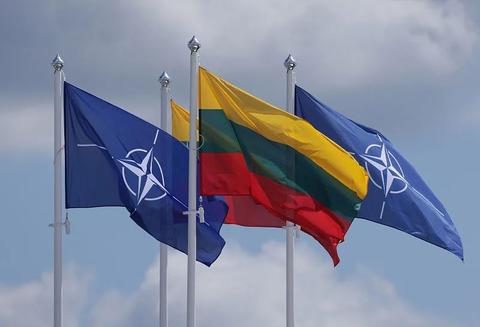By Chen Yang

In Vilnius, Lithuania, the flags of NATO and Lithuania fly over the summit venue. (Photo from Visual China)
During the NATO Summit held in Vilnius, the capital of Lithuania, from July 11th to 12th, the invitation extended to the leaders of Japan, ROK, Australia, and New Zealand exposed NATO's ambition to extend its reach to the Asia-Pacific region.
Against the backdrop of the ongoing Ukraine crisis, the NATO Summit should focus on how to play a constructive role in the peace and stability of Europe and the world, rather than disturbing the peace and stability in the Asia-Pacific region.
NATO's expansion to the Asia-Pacific goes against its own positioning. NATO was established during the Cold War, and its activities were primarily focused on Europe and Oceania. However, as a product of the Cold War, it did not disband after the end of the Cold War, but sought to create a sense of "legitimacy" through continuous expansion, instead. It started with the eastward expansion to counter Russia, and now it is pushing for an expansion to the Asia-Pacific. Such moves clearly deviate from NATO's attribute as a regional military organization. Its expansion into the Indo-Pacific region is highly dangerous.
NATO's expansion to the Asia-Pacific also faces significant internal controversies. While NATO is nominally a transatlantic alliance, it is effectively led by the US, and the push by NATO largely serves the needs of the US in maintaining global hegemony. Within NATO, while countries like the UK actively follow the US in its "Indo-Pacific strategy," countries like France seek to reduce the risk of confrontation with China. They are unwilling to take sides in the competition between China and the US, and also do not want NATO to interfere in non-military issues such as investment, technology, and trade that should be decided autonomously by member states. French President Emmanuel Macron explicitly opposed and warned against the expansion of NATO's geographical scope beyond the North Atlantic region, stating that "we will make a big mistake."
NATO's expansion to the Asia-Pacific will only bring turmoil and instability to the region. Over the past few decades, NATO, led by the US, has waged wars under the banner of "humanitarian intervention," for examples, the Kosovo War, interventions in Iraq, Libya, and Syria, and a 20-year occupation of Afghanistan. Incomplete statistics show that wars launched and participated by NATO since 2001 have caused the deaths of 900,000 people, including 400,000 civilians, and have displaced tens of millions of refugees. NATO remains trapped in Cold War thinking and is keen on creating group confrontations. If NATO brings such thinking into the Asia-Pacific, it will severely threaten the peace and stability of the region.
Since the outbreak of the Ukraine crisis, NATO has been intensifying substantive connections with countries in the Asia-Pacific region, from deepening defense cooperation to conducting joint military exercises and even seeking to establish its first liaison office in Asia. NATO's pace is accelerating. Young-Sun Ha, Chairman of the East Asia Institute in ROK, believes that under the leadership of the US, NATO is attempting to extend its reach from the Atlantic to the Pacific, which not only increases security risks in the Asia-Pacific region but may also disrupt the process of regional economic integration, slow down or even hinder the development of countries within the region. This must be highly vigilanted.
The Asia-Pacific region has suffered from conflicts and turmoil, becoming an arena for great power competition and a gathering place for international contradictions. History has shown us that bloc confrontation cannot solve problems, and prejudice will only bring disasters. It is precisely because the region has emerged from the shadow of the Cold War that the Asia-Pacific region, especially small and medium-sized economies, has entered the fast lane of modernization. The desire of regional countries for peace, development, and cooperation is more pressing in the current international situation. Any attempt to foment a "new Cold War" will be rejected by the public, and the times will not permit it.
Editor's note: Originally published on haiwainet.cn, this article is translated from Chinese into English and edited by the China Military Online. The information and opinions in this article do not necessarily reflect the views of eng.chinamil.com.cn.













